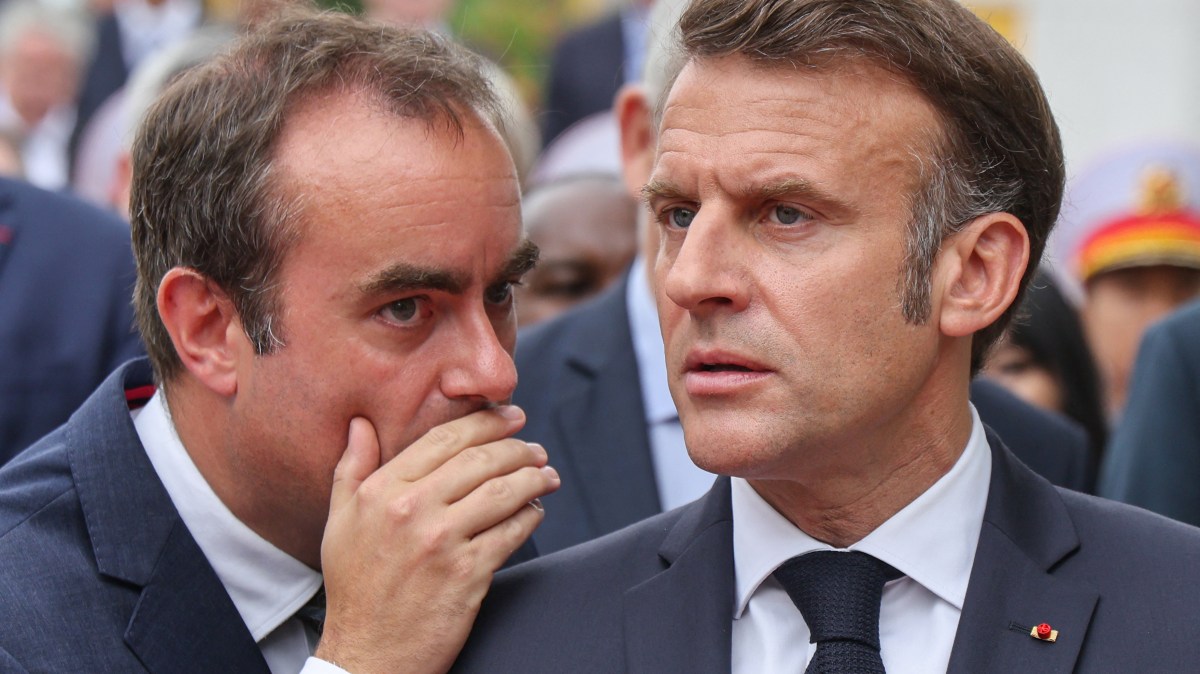
Sebastien Lecornu was Emmanuel Macron’s fourth prime minister in a just over a year
LUDOVIC MARIN/AFP/GETTY IMAGES
France’s Fourth Republic, which Charles de Gaulle brought to a merciful end in 1958, was characterised by chronic instability. Two of its prime ministers lasted only days. With President Macron having got through five prime ministers since his re-election in 2022, the Fifth Republic, created by de Gaulle as an antidote to political chaos, is beginning to look a lot like its predecessor.
The consequences of France’s political implosion will be felt far beyond its own borders. While Germany has at times appeared uncertain in the face of Russian aggression, Mr Macron has been a passionate and effective advocate for supporting Ukraine since its invasion. The principal winner from France’s turmoil is Vladimir Putin.
France’s latest prime minister, who entered office only a month ago, resigned on Monday. Sébastien Lecornu failed to get the other parties in his centre-right coalition to agree to the government he had put together. At Mr Macron’s request, Mr Lecornu has agreed to try again, for another 48 hours. But even if he staves off immediate collapse, he is unlikely to succeed in restoring enduring political stability. The financial markets have acknowledged this truth with another tremor. French bond yields have risen above those even of highly indebted Italy and Greece.
The comparison with Italy is particularly painful. Not so long ago, France looked down on Italy for its chronic fiscal irresponsibility and turbulent politics. Now, their positions have been reversed. Italy’s Giorgia Meloni has been in power for three years and reduced her country’s annual budget deficit to substantially below that of France.
Patience is running out with Mr Macron: two former prime ministers are calling for his resignation. The president must, indeed, take much of the blame for this mess. He took a reckless gamble last year by calling a snap parliamentary election in which his centrist party lost badly and the far-right National Rally and the far left gained seats. The result is a hung parliament paralysed by factionalism and incapable of producing a government that can pass a budget.
• President Macron is a lame duck running out of options
But Mr Macron’s failures go further back than that. He has not delivered on his original promise to be a competent technocrat who would solve France’s deep economic problems. Eight years after he came to power, the budget deficit is running at 5.4 per cent, the national debt stands at 116 per cent of GDP, much higher than Britain’s, and the economy is stagnant.
Mr Macron’s opponents, however, are also in part responsible. It is they who have refused to compromise over attempts by his prime ministers to pass a budget reflecting France’s deteriorating fiscal position. Marine Le Pen of the National Rally and Jean-Luc Mélenchon, her opponent on the left, seem interested only in gaining power. The national interest is neither here nor there.
In the end, though, the responsibility lies with the French people. France’s welfare state is one of the most generous in the world, the costs of which cannot be covered even by the country’s exorbitant taxes. Mr Macron has tried to place the country on a stable fiscal footing but his efforts have met with a furious response, twice leading to civil disorder. The gilets jaunes protests against petrol taxes in 2018 were followed by those in 2023 over raising the state retirement age from 62 to 64. The unpopularity Mr Macron incurred through attempting to drive through these admittedly necessary measures has hobbled his party.
France’s government may limp on. There may be fresh parliamentary elections; there could be an early presidential election. Whatever happens, France’s problems will not be solved by endless changes of administration in the old Italian style. Instead, its people must cease being in denial and accept that they are living beyond their means. Shooting the messenger will do no good.
